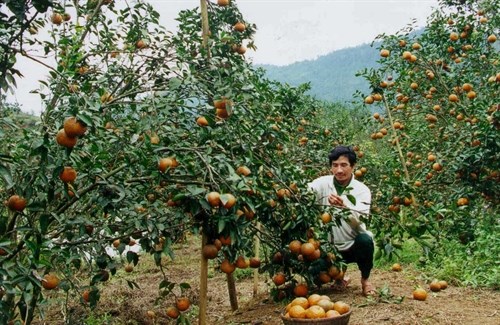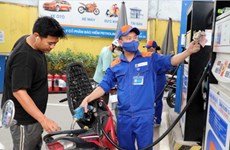Integrated farming a hit with room to grow
 A farmer in Tan Tau Village collects oranges in the northern mountain province of Ha Giang’s Bac Quang District (Photo: VNA)
A farmer in Tan Tau Village collects oranges in the northern mountain province of Ha Giang’s Bac Quang District (Photo: VNA)Hanoi (VNA) –Trịnh Quốc Huy and his family own a five-hectare farm with various fruit plants of great renown across the country and local varieties.
The farm, located in Viet Lam Town, the northern mountainous province of Ha Giang’s Vị Xuyên district, has been developed following the garden-pond-livestock pen (VAC) model and earns Huy billions of dong annually.
Besides local varieties of plants and animals, the garden is home to buoi da xanh (green skin grapefruit), buoi Dien (a type of pomelo), cam Canh (sweet orange), among others. Husbandry alone brings Huy some 2 billion VND (89,000 USD) each year.
Huy is ready to share farming knowledge and provide quality young plants and livestock breeds for local farmers.
The VAC model has also generated regular jobs for local labourers, earning them a monthly income of some 4million VND (180 USD).
“I had travelled here and there, at home and abroad, seeking to start a business. After days of ups and downs, I realised that farmers could get rich mostly from agricultural production. My wife and I dreamed of building our farm on our homeland,” said Huy.
“We developed a large self-contained farm for fruit trees and animals. We returned from Russia in 2008. After almost 10 years, we believe we are on the right track,” he said.
"The integrated farming system, a Vietnamese approach to household production of clean nutritious food, is worth being considered a typical example of economic development based on local advantages," said the Vietnam Gardening Association’s Chairman, Prof. Ngo The Dan.
According to the Ministry of Agriculture and Rural Development (MARD), developing the farming economy is increasingly important.
Dan said reports from provincial Gardening Associations showed that about 50 per cent of uncultivated gardens and ponds in each locality had been restored in accordance with the VAT model.
The farming system makes up between 50 – 60 percent of local households’ annual income, reports from Thanh Hoa and Ha Tinh provinces’ Gardening Associations show.
The family of Nguyen Thanh Tuan in central Quang Nam province’s Nui Thanh district turns over 5 billion VND annually from the integrated farming system, creating jobs for five locals.
In the five-hectare farm, Tuan raises various animals including chicken, ducks, pigs, salamanders and fish, and 500 fruit trees.
In the southern provinces of Ben Tre, Tien Giang and Vinh Long, local gardening associations developed farming areas specialising in fruit trees in line with Good Agricultural Practices (GAP), which makes between 600-700 million VND per hectare.
Head of the Economic Cooperation Division, MARD’s Department for Economic Development and Rural Development, Tran Dinh Dung said the gardening economy had grown vigorously and developed in many ways, including one which combines garden, pond, livestock and forest.
“The farming system has made a good earning for households, showing its essential role in the agricultural sector,” Dung said.
However, Dung admitted, the full potential of the model has not been brought into play.
He called for proper policies to develop the system, as there was a lack of linkage between production and sales.
“Investment capital size remains limited and processing technologies are not highly developed. Product quality has yet to meet market demand and farmers can’t develop strong and competitive brands,” he said.
Acting Director of the National Farming Promotion Centre, Tran Van Khoi said due to its vital role in the agricultural economy, the State should introduce policies facilitating farming households, especially in the application of advanced science and technology.
Prof. Ngo The Dan, also former deputy MARD minister, said those involved in the sector need to equip themselves with information and technology, know how to promote their produce on the internet, look for markets, and organise ecological tourism models on their farms.-VNA











